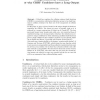499 search results - page 19 / 100 » Why neighbor-joining works |
MOZ
2004
Springer
14 years 3 months ago
2004
Springer
Common programming practice grants excess authority for the sake of functionality; programming principles require least authority for the sake of security. If we practice our princ...
ICRE
2000
IEEE
14 years 2 months ago
2000
IEEE
Unless you have a complete and precise description of your product’s requirements, it is very unlikely that you will satisfy those requirements. A requirements document that is ...
SIGCSE
2000
ACM
14 years 2 months ago
2000
ACM
Classifying is a central activity in object-oriented programming and distinguishes it from procedural programming. Traditional logic, initiated by Aristotle, assigns classificatio...
GECCO
2006
Springer
14 years 1 months ago
2006
Springer
The effects of neutrality on evolutionary search have been considered in a number of interesting studies, the results of which, however, have been contradictory. Some researchers ...
CRYPTO
2008
Springer
13 years 11 months ago
2008
Springer
A black-box combiner for collision resistant hash functions (CRHF) is a construction which given black-box access to two hash functions is collision resistant if at least one of th...


